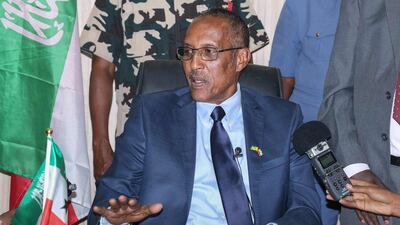Muse Bihi Abdi of the ruling Kulmiye party was declared the winner of Somaliland's presidential election on Tuesday.
The electoral commission of the breakaway region says Abdi won 55 per cent of votes counted, while Abdirahman Iro of the Wadani opposition secured 40 per cent. Turnout was 80 per cent.
Situated at the northern tip of east Africa on the Gulf of Aden - one of the busiest trade routes in the world – Somaliland broke away from Somalia in 1991 following a bloody civil war and has been relatively peaceful since. The region of 4 million people has not been internationally recognised but it has recently drawn in sizeable investments from the Gulf.
The poll had originally been scheduled for 2015 but was delayed by political spats and severe drought.
There was no immediate comment from Iro, whose party had accused Kulmiye of vote-rigging although it has not given evidence.
_______________
Read more:
Breakaway Somaliland to elect president
DP World says to build economic free zone in Somaliland
Somaliland agrees to UAE naval base in northern port
_______________
Electoral officials call the election the first in Africa to use iris-scan biometric technology to prevent anyone from voting more than once.
A UK government-funded international observer mission said the poll in the former British protectorate "preserved the integrity of the electoral process" and concluded irregularities were limited and did not undermine the vote.
Hundreds of ruling party supporters have taken to the streets while soldiers stand guard across Hargeisa, Somaliland's capital.
Some voters hope the election will help the push for international recognition.
In a debate before last week's vote, Abdi pledged to boost women's participation in politics and introduce compulsory national service for high school and university graduates.
Analysts say the region enjoys strong ties with neighbouring Ethiopia and Djibouti as well as its growing investment from the Gulf. Earlier this year the government agreed to let the UAE establish a naval base in its port of Berbera.
That came after Dubai's DP World last year signed a multimillion dollar, 30-year contract to develop the same port, which is on the south coast of the Gulf of Aden.
Earlier this month, DP World said it would also develop an economic zone in the region, modelled on Dubai’s Jebel Ali Free Zone.
The new economic zone is aimed at positioning Berbera as a gateway port for East Africa, by encouraging investments and trade in the warehousing, logistics, manufacturing and related businesses.

